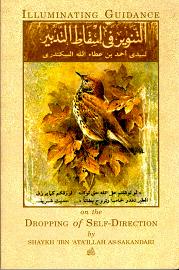Book | Ibn ‘Ata Allah: Kitab al-Tanwir
.
 المكتبة الأزهرية 2007
المكتبة الأزهرية 2007  Transl. as "Tevekkül'ün İncelikleri / Tedbiri Terk Etmenin Esasları"
Transl. as "Tevekkül'ün İncelikleri / Tedbiri Terk Etmenin Esasları"  Urdu translation by Shaykh Ashraf Ali Thanvi
Urdu translation by Shaykh Ashraf Ali Thanvi  Recommended translation: "Illuminating Guidance on dropping Self-Direction" by Ibrahim Hakim (Noon 2011)
Recommended translation: "Illuminating Guidance on dropping Self-Direction" by Ibrahim Hakim (Noon 2011) View Summary | Scanned pages | PDF
Alternative translation from nmusa PDF | amazon
 Sobre el abandono de sí mismo - trad Juan José González
Sobre el abandono de sí mismo - trad Juan José GonzálezPresentation
One cannot overestimate the value of Imam Ibn ‘Ata’Illah, may Allah be pleased with him, in preserving the teachings of the Shadhdhuliyyah, since he was the first to write them down. Both Imam Abu’l-Hasan ash-Shadhdhuli and his successor Imam Abu’l ‘Abbas al-Mursi, may Allah be pleased with them, never wrote any books on the Path. When asked why, Abu’l-Hasan replied, “My companions are my books.” Be that as it may, the teachings would not have survived down to this day as they have if Allah had not inspired Ibn ‘Ata’Illah to put them into written form.
One of the main reasons why this specific book is so fundamental is that it deals with a cardinal doctrine of the Shadhdhuli teaching, namely, the ceasing of self-direction and management in favour of choosing the management and direction of Allah (isqat at-tadbir). A major subject, to which actually half the book is devoted, is rizq, or provision and daily sustenance.
Ibn ‘Ata’Illah deals with the proper approach to acquiring one’s daily provision, the proper manners of withholding it and spending it, and most importantly, how and why one should not waste one’s energy in anxiety over it. In this respect, the Way of the Shadhdhuliyyah, unlike some of the other ways of Sufism, does not call for a life of begging and mendicancy, but rather teaches its adherents to live a life of intense contemplation in the midst of the worldly means of livelihood. In other words, ‘being in the world but not of the world.’ And the importance of this book can also be seen in the method it teaches the reader of how to apply this advice.
Chapters
—Introductions
—Chapter [1]. Submission and Abandoning Tadbir,
—Chapter [2]. Complete and Total Submission,
—Chapter [3]. The Stations of Certainty (Yaqin),
—Chapter [4]. The Means of Abandoning Tadbir with Allah Almighty,
—Chapter [5]. The Abandonment of Tadbir is the Noblest of the Divine Miraculous Gifts (karamat),
—Chapter [6]. The Submission of the ‘Face’ to Allah Almighty,
—Chapter [7]. The Types of Tadbir,
—Chapter [8]. The Divested of Means (mutajarrid) & the One of Means (mutasabbib),
—Chapter [9]. The Secret Purpose in the Creation of Tadbir,
—Chapter [10]. Tadbir in the Daily Provision (rizq),
—Chapter [11]. The Intended Desire of Allah Almighty in Creating Jinn and Man,
—Chapter [12]. The Gurantee of Sustenance by Allah Almighty for His Servants,
—Chapter [13]. The Coupling of Creation (khalq) and Sustenance (rizq),
—Chapter [14]. The Obligation to Command the Family to Salat,
—Chapter [15]. How Allah Almighty takes Responsibility fort Providing Sustenance,
—Chapter [16]. The State and Nature of Rizq,
—Chapter [17]. The Wisdom in Taking a Means of Livelihood (asbab),
—Chapter [18]. Reliance on Allah Almighty and the Taking of Means,
—Chapter [19]. The Explanation of the Litany of Shaykh Abu’l Abbas,
—Chapter [20]. The Harm of Tadbir with Allah Most High,
—Chapter [21]. Utterances of ther Realities.
—Concluding Supplication (du’aa),
